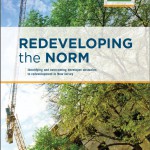New Jersey Future Blog
Less Sprawl = Better Health
November 5th, 2004 by Tim Evans
- People who live in sprawling metropolitan areas are more likely to suffer chronic health problems such as arthritis, asthma, migraine headaches, heart disease, and high blood pressure than those who live in more compact communities, according to a study published in the October journal of Public Health.
- The study of nearly 9,000 Americans in 38 metropolitan areas found those living in the most sprawling places had health characteristics similar to someone four years older than those living in the least sprawling places.
- The researchers examined the association between 16 health problems and the amount of sprawl where participants lived, using a scale that includes such measures as population density, street patterns, and the proximity of businesses and workplaces to residences.
- Very spread-out metro areas, such as Atlanta, had about 100 more health problems per 1,000 people than areas that were less so.
- The study also found the unhealthful impacts of sprawling areas disproportionately affect the poor and the elderly, who often have fewer resources to make up for the limitations created by their environment.
(Source: “Suburban Sprawl and Physical and Mental Health,” Public Health, October 2004.
HEALTHY COMMUNITIES THROUGH SMART GROWTH
Health experts have become increasingly concerned that an auto-dependent and sedentary lifestyle contributes to a host of health problems. Previous health studies have linked sprawl to an increased risk of being overweight and obese and certain related health problems, such as high blood pressure. This new study is the first to directly examine the relationship between sprawl and a wide spectrum of chronic illnesses.
The greater prevalence of chronic health problems among residents of sprawl is presumed to be because sprawling land use patterns discourage physical activity, increasing the chances of being overweight or obese. In contrast, residents of communities — like many of New Jersey’s older suburban communities — with shops, schools, offices, and entertainment within safe walking or biking distance get more exercise and spend less time amid the frustrations and pollutions of heavy traffic congestion caused by sprawling development. This study suggests where you live can make you a healthier person.
















